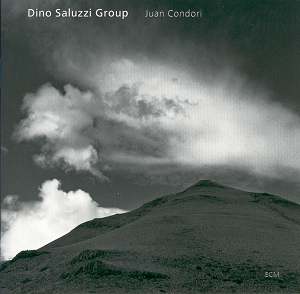1. La Vuelta De Pedro Orillas
2. Milonga De Mis Amores
3. Juan Condori
4. Memoria
5. La Parecida
6. Inside
7. Soles / La Camposanteña
8. Las Cosas Amadas
9. A Juana, Mi Madre
10. Los Sauces
11. Improvisación
12. Chiriguano
All compositions by Dino Saluzzi, except Milonga
De Mis Amores by Pedro Laurenz, Soles
by José Maria Saluzzi, and Improvisación
by Dino Saluzzi Group
Dino Saluzzi – bandoneon
Felix ‘Cuchura’ Saluzzi – saxophones, clarinet
José Maria Saluzzi – acoustic &
electric guitars
Matias Saluzzi – double-bass, bass guitar
U.T. Ghandi – drums, percussion
Rec. October 2005, Estudios Moebio, Buenos
Aires
I first came across the melancholy
expressiveness of Dino Saluzzi on his 1988
album Andina (ECM 1375) on which he
also plays flute. The bittersweet tango sound
of the bandoneon is of course infused with
its own melancholic, wood-smoke infused nostalgia,
but Saluzzi’s sound and taste in music is
often minor in key and expression. Even where
you might expect a more up-beat character,
as in the famous Milonga De Mis Amores,
there is a feeling of the story being told
through misty recollections rather than being
played out live before our excited ears and
eyes. While I was less impressed by Saluzzi’s
album ‘Senderos’(ECM 1845) with drummer Jon
Christensen, I do admit to having a soft spot
for his honest music making, and have an admiration
for anyone able to play the bandoneon at all,
let alone with Saluzzi’s grace and creativity
with that least logical and most impossible
of instruments.
The sonic fingerprint of
ECM is ever present on this album, with all
of the instruments bathed in glorious resonance.
Saluzzi’s bandoneon is quite closely miked
for much of the time, so that at some points
the left and right hand notes hocket between
your speakers as if the instrument was several
metres wide. Depending on your hi-fi setup,
you can close your eyes and imagine a Saluzzi
with really long arms.
Surreal acoustic effects
to one side, Dino Saluzzi has made this recording
something of a family reunion, with only the
drummer, U.T. Ghandi being a relative ‘outsider’,
nonetheless having toured widely with the
group before now. The reed horn player Felix
Saluzzi is Dino’s brother, and these two have
shared music as a common language since childhood.
Guitarist José Maria Saluzzi is Dino’s
son and Matias Saluzzi is Felix’s son, completing
an ensemble whose synergy is borne out in
the excellent, sensitively responsive playing
on this CD.
The title track refers to
a man who was a friend of the Saluzzi’s from
Dino’s childhood in the village of Campo Santo
in Northern Argentina. In many ways this composition
sums up the work on this recording, with Dino
relating his memories of the man and the time
in music. "My first picture of him is
when I was three or four… now we go back almost
70 years…this picture is inside of me like
a dream… A wise, funny, warm-hearted man…"
I have never met Dino Saluzzi,
but suspect that he has now become something
like that ‘wise, funny, warm-hearted man’
of his memories. There is a certain quiet
joy in a number like La Parecida, where
the rock-steady rhythms come through, remaining
like a mountain range when all the other instruments
have fallen by the wayside. Comparisons with
Piazzolla are inevitable, and the occasional
descending bass line does momentarily recall
his fellow countryman. Once learned, Dino
Saluzzi’s musical language is however distinctive
and very much his own.
I appreciate the variety
of ensemble in this recording. Solo guitar,
duets and trios between instruments, and great
swathes where drums and percussion are silent
make for a refreshing and enjoyable experience.
The sound of the group as a whole is full
and satisfying, and while the element of conventional
‘swing’ is something for which you can wait
a long time here, the deep rhythmic and melodic
souls of these musicians is ingrained into
their performances. I must admit I had expected
a little more from Improvisación,
which is credited to the entire group, but
is in fact a beautiful Dino solo with added
percussion and one or two tentative squeaks
from someone else towards the end. When the
music does take off into more ‘traditional’
jazz regions, as in the main part of the final
track Chiriguano, the group can show
itself as a tightly disciplined unit, always
with a strong element of subtle restraint
which never breaks the spell of poetry in
the recording. The music breathes with its
own natural pace, like that of true folk music,
which can sound fast, but rarely is in fact.
In this case, the music sounds slow, but traverses
hundreds of imaginary miles in mere minutes.
Dominy Clements
